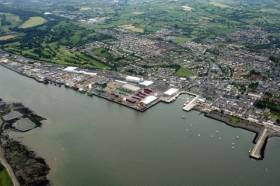Displaying items by tag: BREXIT George Osborne
Cronus Welcomes UK Chancellor Osborne to Warrenpoint Port
#BREXITport? - The UK's Chancellor of the Exchequer George Osborne reports MultiModal, met senior executives from Warrenpoint Harbour Authority (WHA) and local MP's during a visit to the Co Down port yesterday.
The Chancellor met MP Margaret Ritchie, along with Nicola Walker and managing director of Cronus Logistics, as previously reported on Afloat.ie, new operator of Irish Sea container feeder services. This includes the only Ireland-Wales service connecting Dublin and Cardiff along with Belfast and Bristol.
The Chancellor was shown round the docks and observed ro/ro and containerised operations along with the discharge of bulk grain ships. He was also shown timber that is imported through Warrenpoint but ultimately is transported across the land frontiers into the south of Ireland.
“We are pleased that the Chancellor recognises the importance of Warrenpoint as a strategic port for imports and exports in Ireland,” says Nicola.
Speaking to the media during his tour he said, “I’m here at Warrenpoint and it’s a very practical demonstration of the fact that Northern Ireland has the only land border with an EU country… If we quit the EU, this is going to be the border with the EU.”
He later crossed the border on a lorry delivering timber into Dublin.





























































